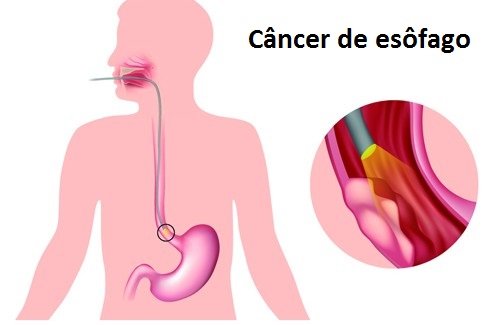ADVERTS
Esophageal cancer is a malignant tumor of the esophagus (muscular tube that moves food from the mouth to the stomach).
It occurs more frequently in people over 50 years of age.
ADVERTS
It presents in two ways: squamous cell carcinoma and adenocarcinoma. The two types are different when observed under a microscope.
Esophageal squamous cell cancer: is associated with smoking and alcohol consumption.
Adenocarcinoma do esôfago: é o tipo mais comum de câncer esofágico e incluem fatores de risco como: sexo masculino, obesidade e fumo.

What are the tests to make a diagnosis?
ADVERTS
Os exames utilizados para ajudar no diagnóstico do câncer esofágico são: Enema de bário,Ressonância magnética do peito ou tomografia computadorizada torácica (geralmente usada para ajudar a determinar o estágio da doença),Ultrassom endoscópico (também pode ser usado para determinar o estágio da doença),Esofagogastroduodenoscopia (EGD) e biópsia, varredura por PET (às vezes útil para determinar o estágio da doença e se a cirurgia é possível) e exame de fezes que podem mostrar pequenas quantidades de sangue nas fezes.
Symptoms
Alguns sintomas de Câncer de esôfago são:Movimento no sentido inverso do alimento através do esôfago e possivelmente da boca (regurgitação),Dor no peito não relacionada ao ato de comer,Dificuldade para deglutir sólidos ou líquidos, Azia, Vômito com sangue e Perda de peso.
Treatment
The recommended treatment is surgery to remove the cancer, when esophageal cancer occurs only in the esophagus and does not spread.
Chemotherapy, radiation, or a combination of the two may be used instead of surgery, or to make surgery easier.
In the case of a patient who is too sick to undergo surgery or when the cancer has spread to other organs, chemotherapy or radiotherapy may be used, which help to reduce symptoms. This is called palliative treatment. In these cases, the disease is generally not curable.
Other tests that may be done to help the patient swallow: Endoscopic dilation of the esophagus (sometimes with the placement of a stent to keep the esophagus dilated). Photodynamic therapy, in which a special drug is injected into the tumor and exposed to light. The light activates the medicine that attacks the tumor.
For patients with disseminated cancer, a cure is usually not possible. The aim of treatment is to alleviate symptoms. If the cancer has not spread outside the esophagus, surgery may increase the chances of survival.
People with symptoms of severe gastroesophageal reflux should seek medical attention.
The so-called EGD scan and biopsy in people with Barrett's esophagus can lead to early detection and increase the chances of survival. Individuals diagnosed with Barrett's esophagus should consider being screened regularly for esophageal cancer.
